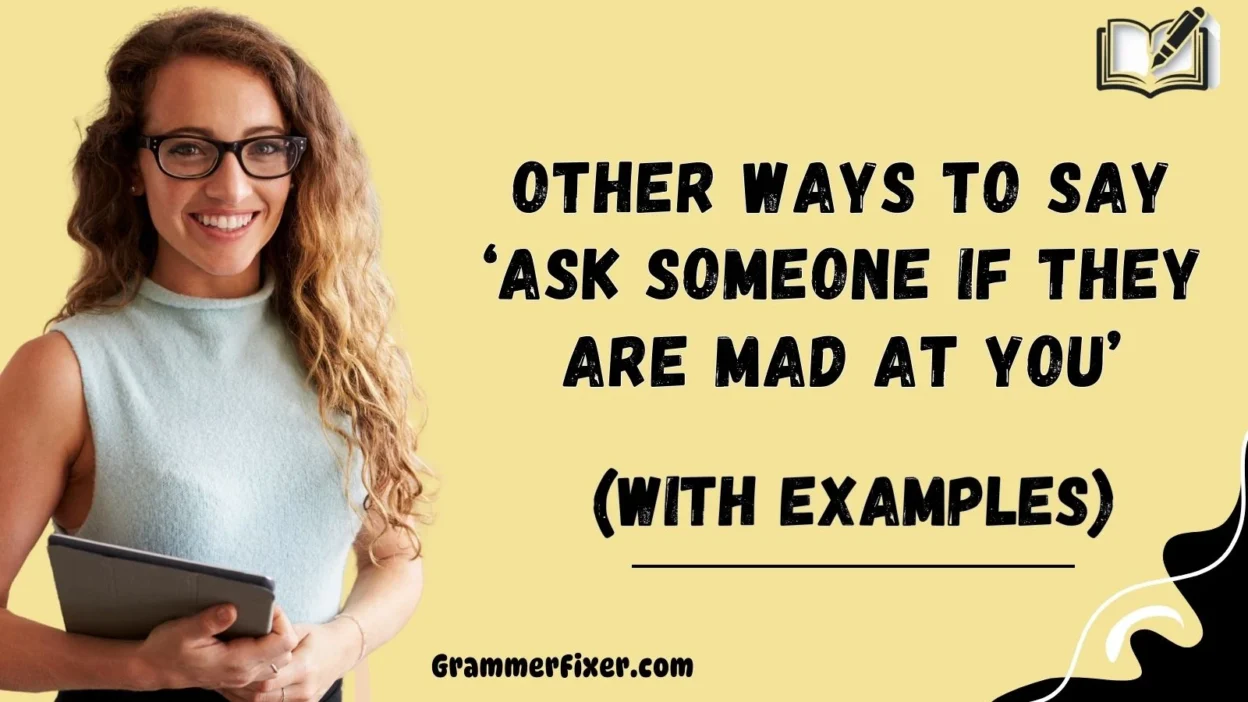Finding the right words to ask if someone is upset with you can make all the difference between creating more tension or opening the door for a warm and meaningful conversation. Instead of using a blunt question like “Are you mad at me?”, choosing a gentle, empathetic, and thoughtful phrasing can show that you truly care about the other person’s feelings, and it can help prevent misunderstandings.
In this article, you’ll discover 30 alternatives to ask this question in a way that feels considerate and natural—whether through text, email, or in-person conversations.
What Does “Are You Mad at Me?” Mean?
The phrase “Are you mad at me?” is a direct question used to check if another person is upset, angry, or hurt by something you’ve said or done. While it’s simple, it can sometimes come across as accusatory, blunt, or even pressuring the other person to respond quickly.
When to Use “Are You Mad at Me?”
Use it when you genuinely sense a change in someone’s tone, mood, or behavior, such as them becoming quiet, distant, or terse in conversation. It’s best used when you’ve had a recent interaction that might have caused discomfort, or when you want to clarify misunderstandings before they grow into bigger issues.
Is It Professional/Polite to Say “Are You Mad at Me?”
In professional environments, this phrase might feel too personal or informal. Instead, a more professional alternative would be something like: “I hope everything is okay between us—if I’ve done something concerning, please let me know.” In personal relationships, though, it can be appropriate, as long as it’s asked with a gentle tone.
Pros or Cons
Pros:
- Opens up the chance for an honest conversation
- Shows care and awareness of the other person’s feelings
- Helps prevent misunderstandings from escalating
Cons:
- May sound accusatory or needy
- Can make the other person feel pressured
- Risks being misinterpreted if the tone isn’t clear
1. “Is Everything Okay Between Us?”
Meaning: A softer way to check if something is wrong.
Detailed Explanation: This phrase avoids putting the focus only on yourself and instead checks on the overall relationship.
Scenario Examples:
- “Hey, I noticed you’ve been quiet lately. Is everything okay between us?”
- “I just want to be sure I haven’t done anything to upset you.”
Best Use: When you sense distance but want to keep things non-confrontational.
Worst Use: In formal professional emails—it might feel too personal.
Tone: Warm, caring, and considerate.
2. “Have I Done Something to Upset You?”
Meaning: Direct but framed with humility.
Detailed Explanation: It acknowledges that you might be at fault without claiming blame unnecessarily.
Scenario Examples:
- “I hope I haven’t done something to upset you. If I did, I’d like to fix it.”
- “Please tell me if I’ve hurt you somehow—I’d never want that.”
Best Use: With a close friend or partner where openness is expected.
Worst Use: With a manager or colleague—it can sound overly personal.
Tone: Honest and vulnerable.
3. “You Seem a Bit Quiet, Is Something Wrong?”
Meaning: Observes behavior first before asking.
Detailed Explanation: This approach shows that you’re noticing signals rather than making assumptions.
Scenario Examples:
- “You’ve been a little quiet today, is something wrong?”
- “I noticed you’re not your usual self—want to talk about it?”
Best Use: In friendships or relationships where the person’s mood usually shows.
Worst Use: If the person is naturally reserved—it may sound intrusive.
Tone: Gentle and observational.
4. “Did I Say Something That Bothered You?”
Meaning: Shows accountability for your words.
Detailed Explanation: By focusing on your behavior, this helps avoid putting the other person on the defensive.
Scenario Examples:
- “I just want to check—did I say something that bothered you?”
- “Sometimes I don’t realize how my words come across, please tell me if I upset you.”
Best Use: After a specific conversation that seemed to change the mood.
Worst Use: In general situations without context—it may sound like fishing for reassurance.
Tone: Sincere and humble.
5. “I Feel Like There Might Be Some Distance—Did I Do Something?”
Meaning: Expresses emotional awareness without accusing.
Detailed Explanation: This phrase acknowledges a perceived change in connection and gently checks if you might be the cause. It opens space for the other person to share their perspective.
Scenario Examples:
- “I feel like there’s been a little distance between us—did I do something?”
- “You seem a bit far away lately, I just want to be sure I didn’t cause it.”
Best Use: With someone you share an ongoing close relationship with.
Worst Use: With a new acquaintance—it may feel too intense.
Tone: Reflective, warm, and empathetic.
6. “If I Did Something Wrong, Please Let Me Know.”
Meaning: Invites honest feedback without assuming blame.
Detailed Explanation: This phrase communicates humility and openness while reassuring the person you’re willing to listen and fix things.
Scenario Examples:
- “If I did something wrong, please let me know so I can make it right.”
- “I’d rather talk about it than let it create distance between us.”
Best Use: In personal and semi-professional contexts (like with a colleague you know well).
Worst Use: With very formal business settings—it may feel out of place.
Tone: Respectful and conciliatory.
7. “I Hope I Didn’t Offend You.”
Meaning: Checks if you unintentionally caused offense.
Detailed Explanation: This wording works well when you’re unsure if something you said or did was taken the wrong way. It’s a subtle, polite approach.
Scenario Examples:
- “I hope I didn’t offend you with what I said earlier.”
- “Please tell me if I came across the wrong way—I truly didn’t mean to.”
Best Use: After making a comment or joke that may not have landed well.
Worst Use: With people who don’t usually take things personally—it may sound like overthinking.
Tone: Polite and thoughtful.
8. “Are We Good?”
Meaning: Casual and simple check on the relationship’s state.
Detailed Explanation: Short and direct, this phrase works best in informal settings where relationships already have openness and trust.
Scenario Examples:
- “Hey, I know things got a little heated—are we good?”
- “I just wanted to check in. Are we good after that conversation?”
Best Use: With friends or close colleagues where casual language fits.
Worst Use: In formal or professional emails—it can sound too casual.
Tone: Light and approachable.
9. “I’m Wondering If Something I Did Is Bothering You.”
Meaning: Reflects curiosity without demanding an answer.
Detailed Explanation: This phrase uses “wondering” to sound gentle and open-ended, giving the other person room to share if they choose.
Scenario Examples:
- “I’m wondering if something I did might be bothering you?”
- “I just want to make sure I haven’t crossed a line.”
Best Use: When you suspect your actions may have unintentionally caused discomfort.
Worst Use: If the other person already reassured you—it may seem like over-apologizing.
Tone: Soft, inquisitive, and empathetic.
10. “Did I Do Something to Upset You?”
Meaning: Straightforward but caring.
Detailed Explanation: A close variation of the classic question, but with slightly softer framing, making it less confrontational.
Scenario Examples:
- “Did I do something to upset you earlier in the meeting?”
- “You’ve been a little distant—did I do something?”
Best Use: With someone you’re comfortable being direct with.
Worst Use: In situations where subtlety is preferred—it can feel too pointed.
Tone: Clear, honest, and attentive.
11. “It Feels Like Something’s Wrong—Want to Talk About It?”
Meaning: Focuses on the situation rather than blame.
Detailed Explanation: This phrasing shows sensitivity and shifts the focus from your possible actions to the general dynamic.
Scenario Examples:
- “It feels like something’s wrong—want to talk about it?”
- “I get the sense something’s on your mind. Do you feel like sharing?”
Best Use: When the person seems distant, quiet, or upset but hasn’t said why.
Worst Use: If you’re unsure of the relationship’s closeness—it could feel invasive.
Tone: Supportive and open.
12. “I Value Our Relationship and Don’t Want Anything to Come Between Us.”
Meaning: Emphasizes care and the importance of the relationship.
Detailed Explanation: This phrase prioritizes the connection above the issue, showing genuine commitment to resolving tension.
Scenario Examples:
- “I value our friendship, and I don’t want anything to come between us. Did I upset you?”
- “You’re important to me, and I’d like to clear the air if I did something wrong.”
Best Use: In close relationships—friendship, family, or romantic.
Worst Use: With casual or professional acquaintances—it may sound overly intense.
Tone: Heartfelt, genuine, and caring.
13. “Can We Clear the Air?”
Meaning: Suggests resolving any underlying tension.
Detailed Explanation: A neutral, constructive phrase that avoids blame and focuses on moving forward productively.
Scenario Examples:
- “Can we clear the air about what happened in the meeting?”
- “I’d like to clear the air so we can move forward without any awkwardness.”
Best Use: In both personal and professional contexts where something felt off.
Worst Use: If no real issue exists—it may unnecessarily draw attention.
Tone: Diplomatic and proactive.
14. “I Hope Everything’s Okay Between Us.”
Meaning: Shows care without assumptions.
Detailed Explanation: This phrase conveys concern but doesn’t immediately place blame, which helps the other person respond more comfortably.
Scenario Examples:
- “I hope everything’s okay between us. I’ve been sensing some distance.”
- “Just checking in—I hope I didn’t do anything to upset you.”
Best Use: When you want to check in gently.
Worst Use: If you already know there’s conflict—it may sound too soft.
Tone: Polite and caring.
15. “Did I Cross a Line Somehow?”
Meaning: Asks directly if you overstepped boundaries.
Detailed Explanation: A humble phrase that admits the possibility of making a misstep without assuming guilt.
Scenario Examples:
- “I want to ask—did I cross a line somehow?”
- “If I overstepped my mark, I’d really like to know.”
Best Use: When you’re concerned about boundaries in personal or professional relationships.
Worst Use: With overly sensitive topics where indirect wording may be better.
Tone: Respectful, self-aware, and cautious.
16. “I’ve Noticed You Seem Different—Did I Do Something Wrong?”
Meaning: Observes change in behavior and asks gently.
Detailed Explanation: This phrase combines observation with a willingness to take responsibility, making it a balanced approach.
Scenario Examples:
- “I’ve noticed you seem a bit different lately—did I do something wrong?”
- “You don’t seem yourself, and I want to make sure I haven’t upset you.”
Best Use: When you’ve seen a clear shift in mood or behavior.
Worst Use: If the person is naturally moody or private—it could be misinterpreted.
Tone: Empathetic and observant.
17. “I’d Like to Understand If I’ve Upset You.”
Meaning: Centers on understanding, not just questioning.
Detailed Explanation: Shows a willingness to listen and learn, rather than simply seeking reassurance.
Scenario Examples:
- “I’d like to understand if I’ve upset you so we can talk about it.”
- “Please help me understand if something I did came across the wrong way.”
Best Use: In situations where clarity and growth are important.
Worst Use: If the person isn’t ready to talk—it might feel like pressure.
Tone: Open, caring, and thoughtful.
18. “Are You Upset With Me?”
Meaning: A slightly softer version of “Are you mad at me?”
Detailed Explanation: Swaps “mad” for “upset,” which feels more empathetic and less accusatory.
Scenario Examples:
- “I feel like something might be wrong—are you upset with me?”
- “Please tell me if I’ve upset you. I’d rather know.”
Best Use: With someone close, when you want to be direct yet gentle.
Worst Use: In formal settings—too personal.
Tone: Sincere and considerate.
19. “I Feel Like Something’s Off Between Us—Is That True?”
Meaning: Recognizes the relationship dynamic instead of just emotions.
Detailed Explanation: This phrase invites the other person to confirm or correct your perception.
Scenario Examples:
- “I feel like something’s off between us. Is that true?”
- “If I’ve caused that, I’d like to talk about it.”
Best Use: When you want an honest conversation about the relationship’s health.
Worst Use: With casual acquaintances—it might feel too deep.
Tone: Reflective and relational.
20. “Is There Something I Should Apologize For?”
Meaning: Proactively invites accountability.
Detailed Explanation: This phrase takes responsibility in a way that feels genuine and humble.
Scenario Examples:
- “Is there something I should apologize for? I’d like to make it right.”
- “Please let me know if I owe you an apology—I want to fix this.”
Best Use: When you’re fairly sure your actions may have caused offense.
Worst Use: When there’s no clear reason—it may sound like fishing for guilt.
Tone: Humble and sincere.
21. “You Don’t Seem Like Yourself—Did I Do Something?”
Meaning: Uses observation + gentle inquiry.
Detailed Explanation: This checks on their well-being while showing you care about how your actions may affect them.
Scenario Examples:
- “You don’t seem like yourself today. Did I do something to upset you?”
- “I just want to make sure I haven’t caused this change.”
Best Use: With friends, partners, or close co-workers.
Worst Use: With people you don’t know well—it may feel too personal.
Tone: Caring and concerned.
22. “I Hope I Didn’t Overstep.”
Meaning: Checks if you unintentionally crossed boundaries.
Detailed Explanation: This phrase is brief, respectful, and cautious, often useful in professional or polite contexts.
Scenario Examples:
- “I hope I didn’t overstep in the meeting earlier.”
- “Please tell me if I said too much—I didn’t mean to.”
Best Use: In workplace or formal relationships.
Worst Use: With close friends—it may feel too stiff.
Tone: Professional and respectful.
23. “Did I Misunderstand Something?”
Meaning: Places the focus on communication clarity.
Detailed Explanation: Instead of assuming someone is upset, this checks if a miscommunication might be the cause.
Scenario Examples:
- “Did I misunderstand something in our conversation earlier?”
- “I want to make sure I got it right—did I miss something important?”
Best Use: In professional or collaborative environments.
Worst Use: If the problem is clearly emotional—it may sound too detached.
Tone: Neutral and collaborative.
24. “Do You Feel Hurt By Something I Did?”
Meaning: Shows concern for their feelings directly.
Detailed Explanation: Uses empathetic language that centers on the other person’s emotions.
Scenario Examples:
- “Do you feel hurt by something I did? I’d like to understand.”
- “I care about you and don’t want to cause you pain.”
Best Use: With close or intimate relationships.
Worst Use: In workplace or casual interactions—it’s too emotional.
Tone: Compassionate and heartfelt.
25. “I’m Getting the Sense Something’s Bothering You—Did I Cause It?”
Meaning: Gentle and observational check-in.
Detailed Explanation: A balanced way of expressing what you’ve noticed while taking partial responsibility.
Scenario Examples:
- “I’m getting the sense something’s bothering you—did I cause it?”
- “Please let me know if I’ve said something wrong.”
Best Use: When you want to be sensitive and avoid assumptions.
Worst Use: If the person dislikes emotional probing.
Tone: Kind, gentle, and observant.
26. “I Care About How You’re Feeling—Did I Do Something To Upset You?”
Meaning: Couples care with accountability.
Detailed Explanation: This phrase reassures the person that their feelings matter to you, making the question feel more genuine.
Scenario Examples:
- “I care about how you’re feeling—did I do something to upset you?”
- “Your feelings matter to me, so I wanted to check in.”
Best Use: When repairing a friendship or relationship.
Worst Use: With distant colleagues—it may sound too personal.
Tone: Warm and empathetic.
27. “I Want to Make Sure I Haven’t Hurt You.”
Meaning: Expresses concern and responsibility.
Detailed Explanation: A very gentle way of asking, making it clear your intention is care.
Scenario Examples:
- “I want to make sure I haven’t hurt you with what I said earlier.”
- “Please tell me if I’ve done something—I’d never want to cause you pain.”
Best Use: With someone who values emotional reassurance.
Worst Use: With casual acquaintances—it can feel too intense.
Tone: Caring and heartfelt.
28. “Can We Talk? I Feel Like Something’s Wrong.”
Meaning: Opens the door for dialogue without assumptions.
Detailed Explanation: This phrase keeps things general, but shows readiness to listen and clear the air.
Scenario Examples:
- “Can we talk? I feel like something’s wrong and I’d like to understand.”
- “When you’re ready, I’d love to talk—I feel like something’s been off.”
Best Use: When you want to start a calm conversation.
Worst Use: If the timing is bad—they might feel pressured.
Tone: Calm, open, and constructive.
29. “It Seems Like I May Have Upset You—Is That Right?”
Meaning: Puts your perception forward while allowing correction.
Detailed Explanation: This phrasing shows you’re aware of changes and invites them to clarify.
Scenario Examples:
- “It seems like I may have upset you—am I right?”
- “I’d like to fix things if I did something wrong.”
Best Use: With someone you know well enough to read their signals.
Worst Use: If you’re unsure—it may create unnecessary tension.
Tone: Curious and self-aware.
30. “I Don’t Want This to Come Between Us—Did I Do Something?”
Meaning: Expresses commitment to resolution.
Detailed Explanation: Strongly emphasizes the value of the relationship, showing that you care about working things out.
Scenario Examples:
- “I don’t want this to come between us—did I do something?”
- “Our friendship means a lot to me, and I’d like to make things right if I caused this.”
Best Use: With people you deeply value—partners, close friends, family.
Worst Use: With casual contacts—it may feel too intense.
Tone: Genuine, heartfelt, and relationship-centered.
Conclusion
Finding the right words to ask if someone is upset with you isn’t just about avoiding awkwardness—it’s about showing care, humility, and genuine concern for the other person’s feelings. The classic “Are you mad at me?” often feels too blunt, but these 30 thoughtful alternatives give you the chance to ask the same question in a way that feels warm, considerate, and respectful.
When choosing the best phrase, always consider the tone, context, and the nature of your relationship. In personal settings, softer and more emotional language works best, while in professional environments, sticking with polite, collaborative, and respectful wording helps maintain trust and harmony.



